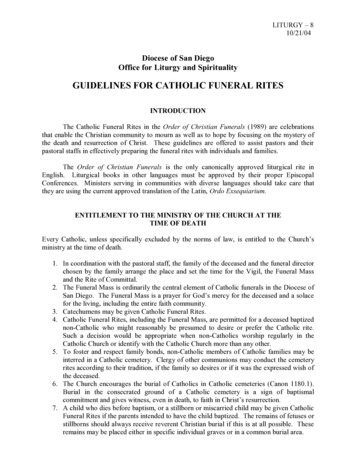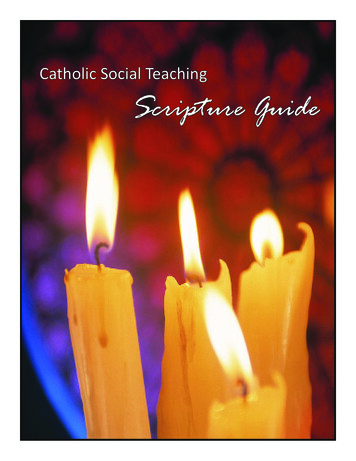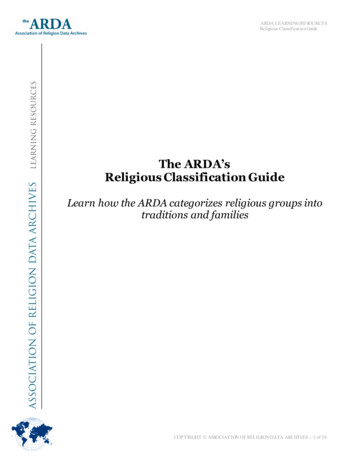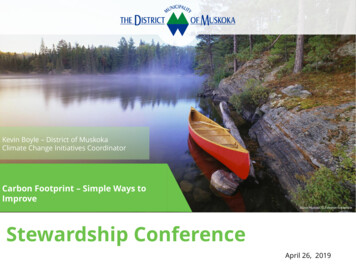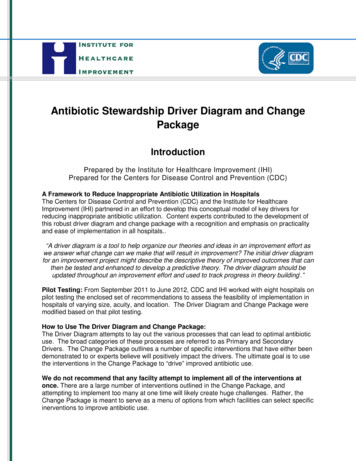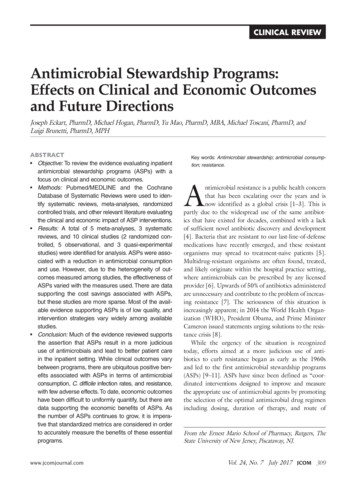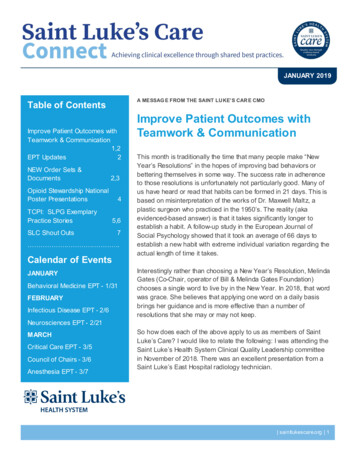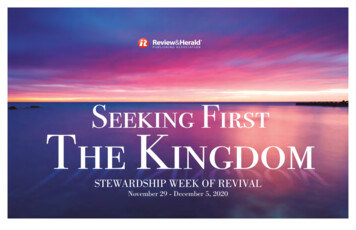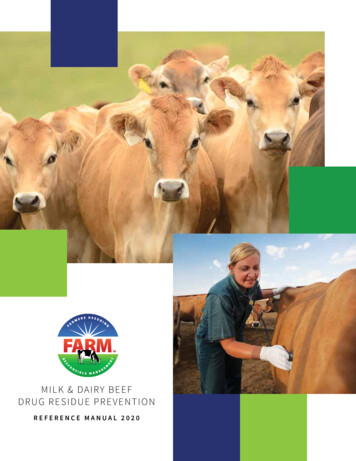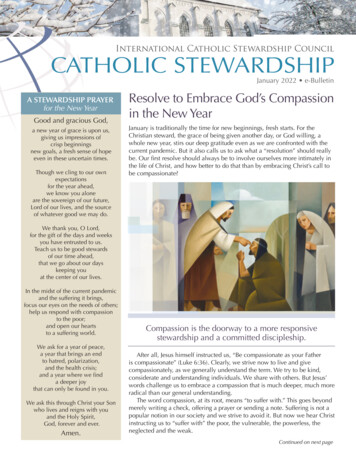
Transcription
International Catholic Stewardship CouncilCATHOLIC STEWARDSHIPJanuary 2022 e-BulletinA STEWARDSHIP PRAYERfor the New YearGood and gracious God,a new year of grace is upon us,giving us impressions ofcrisp beginningsnew goals, a fresh sense of hopeeven in these uncertain times.Though we cling to our ownexpectationsfor the year ahead,we know you aloneare the sovereign of our future,Lord of our lives, and the sourceof whatever good we may do.Resolve to Embrace God’s Compassionin the New YearJanuary is traditionally the time for new beginnings, fresh starts. For theChristian steward, the grace of being given another day, or God willing, awhole new year, stirs our deep gratitude even as we are confronted with thecurrent pandemic. But it also calls us to ask what a “resolution” should reallybe. Our first resolve should always be to involve ourselves more intimately inthe life of Christ, and how better to do that than by embracing Christ’s call tobe compassionate?We thank you, O Lord,for the gift of the days and weeksyou have entrusted to us.Teach us to be good stewardsof our time ahead,that we go about our dayskeeping youat the center of our lives.In the midst of the current pandemicand the suffering it brings,focus our eyes on the needs of others;help us respond with compassionto the poor;and open our heartsto a suffering world.We ask for a year of peace,a year that brings an endto hatred, polarization,and the health crisis;and a year where we finda deeper joythat can only be found in you.We ask this through Christ your Sonwho lives and reigns with youand the Holy Spirit, God, forever and ever.Amen.Compassion is the doorway to a more responsivestewardship and a committed discipleship.After all, Jesus himself instructed us, “Be compassionate as your Fatheris compassionate” (Luke 6:36). Clearly, we strive now to live and givecompassionately, as we generally understand the term. We try to be kind,considerate and understanding individuals. We share with others. But Jesus’words challenge us to embrace a compassion that is much deeper, much moreradical than our general understanding.The word compassion, at its root, means “to suffer with.” This goes beyondmerely writing a check, offering a prayer or sending a note. Suffering is not apopular notion in our society and we strive to avoid it. But now we hear Christinstructing us to “suffer with” the poor, the vulnerable, the powerless, theneglected and the weak.Continued on next page
Continued from previous pageSTEWARDSHIP SAINT for JanuarySaint Angela MericiHow can we possibly choose sucha journey, this challenge to be trulypresent to those who suffer?All things are possible with God,and it is through a commitment to alife of discipline, discipline in actionand discipline in prayer, that we movetowards the goal of true compassion.Jesus’ words challenge usto embrace a compassionthat is much deeper, muchmore radical than ourgeneral understanding.The Christian steward is committed tothe Eucharistic life, and it is throughthis life which Christ offers us thatwe gain the courage and the will andeven the need to follow him in hisown example of compassion.Compassion is the doorway to amore responsive stewardship anda committed discipleship. Throughour deepening sense of compassionin 2022, may we resolve to be thekind of Christian stewards who bringChrist’s presence more profoundly toa suffering world.Angela Merici was born in a small town in the Republic of Venice around1470. She was orphaned when she was ten years old and moved in withrelatives in the city of Brescia, in northern Italy.When Angela Merici returned to her hometown, she began to devoteher life to the education of impoverished young women. In the fifteenth andsixteenth centuries, education for women was reserved for the wealthy, andfor nuns, who were the best educated.Angela loved working with children, and she believed that education andChristian formation were especially needed for young girls. She devoted hertime to teaching girls in her home, which she had converted into a school.Angela brought together a group of unmarried women who went outinto the streets to gather up the girls they saw to teach them and offerreligious instruction in their homes. These women had little money, butwere bound together by their dedication to education and commitment toserving Jesus Christ. She would remind her group that they had a greaterneed to serve the poor than the poor had of their service. She embraced aprayerful and simple lifestyle.Angela loved working with children, and shebelieved that education and Christian formation wereespecially needed for young girls.Angela’s group was so successful that Angela was asked to bring herinnovative approach to educating young women to other cities. Her ministryimpressed many, and was brought to the attention of Pope Clement VII.In 1535, Angela Merici chose twelve young women and formally startedthe Company of Saint Ursula in a small house in Brescia. Although it wasnever a recognized religious order in her lifetime, Angela’s Company of SaintUrsula, or the Ursuline nuns, was the first group of women religious to workoutside of a cloister and the first teaching order of women.Among some of the last pieces of advice she gave her fellow sisters wasa stewardship message: that they should do in life what they would havewanted to do in death. She died on 27 January 1540 at seventy years of age.Her feast day is January 27.
The Challenge of Giving Back toGod in LoveThe following excerpt is Part I of a pastoral reflection on stewardship by the Most ReverendCharles C. Thompson, Archbishop of Indianapolis, Indiana, in his series, “Christ theCornerstone.” Part II of this reflection will be offered in the February eBulletin.Helping YourParish Enhance ItsLife of Stewardshipin the New YearBy Leisa AnslingerAs parishes continue to recover fromnearly two years of the pandemic,turning the page to a new year offersus the opportunity to review time thathas passed, parishioners that havenot returned to Mass, and ministerialactivities that have been deferred. It isa time to look forward to newness oflife and ministry in the year to come.As individuals, we recognizeour many blessings, give thanks forGod’s merciful love, and re-commitourselves to living as disciples and“Amen, I say to you, this poor widow put in more than all the othercontributors to the treasury. For they have all contributed from their surpluswealth, but she, from her poverty, has contributed all she had, her wholelivelihood” (Mk 12:43-44).The Gospel reading for the Thirty-second Sunday in Ordinary Time (Mk 12:3844) tells the familiar story of what has come to be known as “the widow’s mite.”St. Mark tells us that Jesus “sat down opposite the treasury and observed howthe crowd put money into the treasury” (Mk 12:41). As Jesus watches the peoplecontributing money, he observes that “many rich people put in large sums.A poor widow also came and put in two small coins worth a few cents” (Mk12:41-42).The “two small coins” that St. Mark tells us were “worth a few cents”have been identified as bronze mites (lepta in Greek) that are together wortha quadrans, the smallest Roman coin. A mite, or lepton, was the smallest andleast valuable coin in circulation in Judea at the time of Jesus, worth about sixminutes of an average daily wage. This is certainly not a substantial financialcontribution, but as Jesus tells his disciples, the widow’s gift is worth far morethan the large sums contributed by the wealthy.Jesus does not disparage the large gifts from wealthy donors, but he doespraise the widow’s sacrificial gift of two small coins. Why? Because “she, fromher poverty, has contributed all she had, her whole livelihood” (Mk 12:44). Thewidow has made a substantive, sacrificial gift. After contributing her two smallcoins, she has nothing left. The wealthy donors have made significant large giftsthat, presumably, will make a difference in the operations of the Temple. Buttheir gifts come from surplus, not substance. In effect, they are giving what is leftover after all their other needs are met.Who is the good steward here? The wealthy who have lots to give and sharetheir wealth generously? Or the poor woman whose small coins are practicallyworthless? The answer is obvious, but the reasons behind this answer are notalways so clear. After all, stewardship is not about money. It’s about giving fromthe heart.The New Year is a timeto look forward to newnessof life and ministry in theyear to come.stewards, with resolutions to solidifyour commitment to Christ and oneanother. In our parishes, we can do thesame: look back on the year that hasjust passed while looking toward theone to come. While the reflection itselfmay lead to enhanced pastoral life, amore focused examination of past andcurrent practice will bear great fruit.I suggest we do so by using what hasbecome a popular strategic planningand time management phrase: nameit, claim it, aim it!Continued on next page
Continued from previous pageName it: In what ways has your parishhelped people to understand themeaning and spiritual underpinningsof stewardship as a way of life?What annual rhythm of stewardshipeducation, lay witnesses, homilyconnections, and invitation tocommitment has been established?How do you help people recognizestewardship as a disciple’s response,by pointing their attention to Christ’sway of self-giving love?Claim it: List the practices you alreadyhave in place. Where is there roomfor growth? Are there aspects of yourstewardship formation that havebecome stale or have never quitetaken hold? What might you learnfrom effective practices, yours orsomeone else’s, in order to addressthese areas of potential growth?As individuals, we recognizeour many blessings, givethanks for God’s mercifullove, and re-commitourselves to living asdisciples and stewardsAim it: Gather your parish advisorygroup (committee, commission,task group) to reflect and discuss.Invite members to tell their stories ofstewardship insights and challengesin living as a disciple and steward,especially during the last 22 months.Together, give thanks to God forwhat has been, and ask for guidance,insight, blessing and strength as youdiscern future possibilities; celebratethe year that has been; acknowledgethe areas in need of attention; plannew or enhanced strategies for callingpeople to grow as good stewards inthe year that is just beginning. Yourparish will grow in response to God’sgrace and blessing, and you and allwith whom you minister will growas servant leaders, stewards of themysteries of God.ICSC Celebrates Its 60th Anniversaryat the 2022 Stewardship ConferenceMembers of the International Catholic Stewardship Council (ICSC) family willcelebrate ICSC’s 60th anniversary from October 2 to 5, 2022 at the HiltonHotel in Anaheim, California. The theme for this 60th anniversary conferenceis Stewardship: A Disciple’s Response which is the title of the pastoral letterissued by the United States Conference of Catholic Bishops in 1992. The year2022 is also the pastoral letter’s 30th anniversary. The 2022 ICSC StewardshipConference offers its members and other attendees a chance to gather andreflect on stewardship in the Catholic Church and to continue to prepare for itstransformational future in light of our current COVID-19 environment.The 60th anniversary of the Second Vatican Council will be celebrated in 2022as well. This great Council of the Catholic Church first convened on October 11,1962. We remember the Second Vatican Council as an extraordinary moment ofrenewal for the Church and the inspiration behind the establishment of ICSC.The conference image is that of the vestibule dome of Our Lady’s PresentationChapel in Saint Peter’s Basilica at the Vatican. This chapel celebrates thepresentation of the Blessed Virgin Mary. At the opening of the Council, thebishops processed by this altar dedicated to Mary and asked for her prayers andintercessions. The United States bishops’ pastoral letter pays homage to OurLady as the model of Christian stewardship par excellence. ICSC is consecratedto the Blessed Mother and ICSC members continue asking for her intercessionstoday.As a gathering of Catholic stewardship leaders and fund developmentprofessionals from across North America and beyond, the ICSC StewardshipConference continues to support all those looking for creative ways to bringpeople closer to Jesus Christ through their evangelizing and stewardshipformation efforts. ICSC attendees also come together to pray, experience a moreprofound Catholic collegiality and be inspired. The ICSC family invites pastors,parish pastoral staff, Catholic school leaders and Catholic stewardship anddevelopment professionals to join them to embrace the Gospel imperative ofStewardship: A Disciple’s Response.
isciple’sR es ponsehoishtCafBl ictofryersannivh60t AStewaAnaheim, CaliforniaOctober 2-5, 2022:ADThe 2022 Annual ConferenceStewardship: A Disciple’s Responserdshopips’ pCounastciloral letter holiof thVatytraaicanersCouncil 60th Annives CtatSit e dnUethh30 Anniversary of tAdvent/Christmas Discount!Register now for 399.Limited to the first 100 registrants!ICSCHurry! Rates increase January 7, 2022CLICK HERE to register today!
A STEWARDSHIP MOMENTSolemnity of the Blessed Virgin Mary,the Mother of GodSaturday, January 1, 2022Second Sunday in Ordinary TimeWeekend of January 15/16, 2022In today’s first reading, God bestows three blessings uponMoses and directs him to extend those blessings to others:The Lord blesses you and keeps you. The Lord lets his faceshine upon you and be gracious to you. The Lord looksupon you kindly and gives you peace. Good stewardsrealize these blessings are showered upon them in a uniqueand special way each time they receive the Eucharist, andexercising good stewardship of the Lord’s blessings in thissacrament begins by receiving these gifts with profoundgratitude. Take time this week to memorize these marvelousblessings and repeat them to yourself frequently. Make thempart of your morning prayer each day.Third Sunday in Ordinary TimeWeekend of January 22/23, 2022The Epiphany of the LordSunday, January 2, 2022In today’s second reading we hear Saint Paul teach thecommunity at Ephesus that God’s revelation had come,not just to their community, but to others as well; that abroader community of believers was being allowed toexercise stewardship over the Good News. Good stewardsrecognize that it is in our life together as a Eucharisticcommunity that we find ever new vistas and insights intoGod’s vast universe of love and mercy. If we take time tolisten to one another, we discover stories of faith beyondour own. Pause this week to converse with others, listen totheir prayers, and observe acts of kindness and generosity.See if you can gain an understanding of God and the worldthat you have not experienced or known before.The Baptism of the LordWeekend of January 8/9, 2022In today’s reading from the Gospel of Luke we hear theproc lamation of the baptism of Jesus with “all the people.”Indeed, “heaven was opened,” and the Father announcedhis special favor. Whenever we partake of the body andblood of Christ, heed his call in our daily lives, share hisGood News, become instruments of his transformingjustice and peace, heaven is opened to us, and throughthe Holy Spirit, the Lord announc es his special favoron us as well. A good stewardship reflec tion this weekmight be this: How, or in what ways, have we personallyexperienced God’s special favor in our lives?International CatholicStewardship CouncilIn today’s second reading, Saint Paul makes a list of giftsdispensed to members of the Christian community by theHoly Spirit. Each gift bestowed has a specific purpose forthe person for whom it is intended: wisdom, knowledge,faith, healing, mighty deeds, prophecy, discernment,tongues, and interpretation. Good stewards know thesegifts are not meant to be kept hidden by the recipient butto be shared with the community and beyond. As webegin a new year, let us re flect on the gift the Holy Spirithas given to each of us. Do we recognize this gift? Howwas it intended that we use this gift? Are we being goodstewards of this gift?Today’s reading from the Gospel of Luke offers us the firstwords of Jesus as he begins his public ministry. The wordsreflect his understanding of his Spirit-anointed mission.His words are his “Mission Statement.” Good stewardsrejoice in being followers of Jesus. They realize that Jesus’commission is their commission as well. They embraceit and adopt it as their own. We, too, have “glad tidings”to bring to a suffering world. This year, how will we fulfillChrist’s commission in the world in which he has placedus, using the gifts he has entrusted to us?Fourth Sunday in Ordinary TimeWeekend of January 29/30, 2022In today’s second reading we find one of the mostbeautiful and familiar passages in the Bible; a recitationof fifteen characteristics of Christian love typically readat weddings and anniversary celebrations. Of course,this was not what Saint Paul had in mind when he waschastising the Christian community at Corinth for its lackof love. He admonished the members of the community toexercise better stewardship of Christian love. The practiceof patience, humility, joy, truth, peace, affirmation, andhope are ways good stewards put love into action. Mightthere be one or two of these attributes we can work on inorder to grow in our love for God and others?ICSC@catholicstewardship.org(800) 352-3452www.catholicstewardship.com
Helping Your Parish Enhance Its Life of Stewardship in the New Year The New Year is a time . The Gospel reading for the Thirty-second Sunday in Ordinary Time (Mk 12:38-44) tells the familiar story of what has come to be known as “the widow’s mite.” . Conference offers its members an
